Breve Resume de los Webinars / Short Webinar Recaps
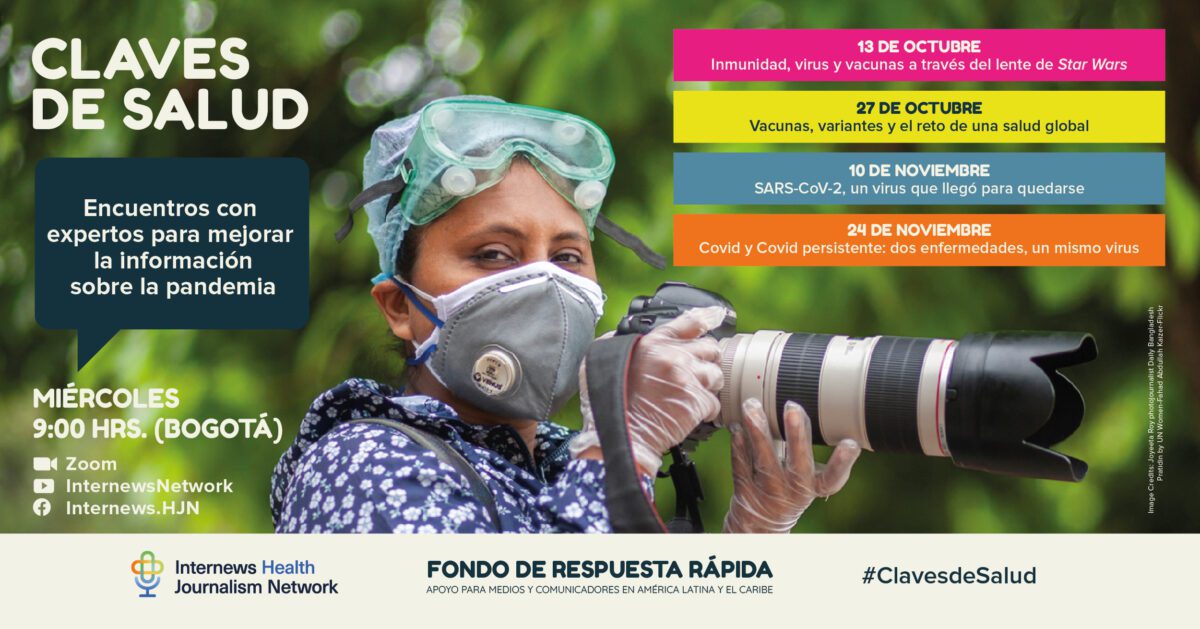
#ClavesdeSalud 1 con Alfredo Corell – Que el sistema inmunológico los acompañe: Inmunidad, virus y vacunas a través del lente de Star Wars
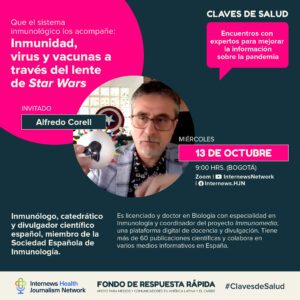
En el primer encuentro de la serie Claves de Salud, conversamos con Alfredo Corell, inmunólogo, catedrático de universidad y divulgador científico español, miembro de la Sociedad Española de Inmunología, quien explica la respuesta de nuestro sistema inmunológico y de las vacunas ante virus como SARS-CoV-2, a través del lente de la saga de Star Wars.
El primer tema que tocamos fue la eficacia de las distintas vacunas disponibles para evitar desarrollar formas graves de la enfermedad, así como el riesgo de desarrollar efectos adversos. En segundo lugar, abordamos la respuesta inmunológica de personas que ya han sufrido la infección frente a aquellas que han recibido un esquema de vacunación completo, resaltando la importancia de vacunarse. Además, hablamos de los avances en la investigación sobre la combinación de dosis de distintas vacunas para mejorar su eficacia.
Con la ayuda del CoronaVader, revisamos los distintos diseños de vacuna y su potencia en estimular nuestro sistema inmunológico y protegernos de la infección a través del tiempo.
ENGLISH TRANSLATION
In the first meeting of the series Claves de Salud, we talked with Alfredo Corell, immunologist, university professor and Spanish science communicator, member of the Spanish Society of Immunology, who explains the response of our immune system and vaccines to viruses such as SARS-CoV-2, through the lens of the Star Wars saga.
The first topic we discussed was the efficacy of the different vaccines available to prevent severe forms of the disease and avoid hospitalization, compared to the possibility of developing adverse effects. Secondly, we addressed the immune response of people who have already been infected versus those who have received a full vaccination schedule, highlighting the importance of getting vaccinated. In addition, we talked about advances in research on combining doses of different vaccines to improve their efficacy.
With the help of the CoronaVader, we reviewed the different vaccine designs and their potency in stimulating our immune system and protecting us from infection over time.
#ClavesdeSalud 2 con Rafael Vilasanjuan: Vacunas, variantes y el reto de una salud global
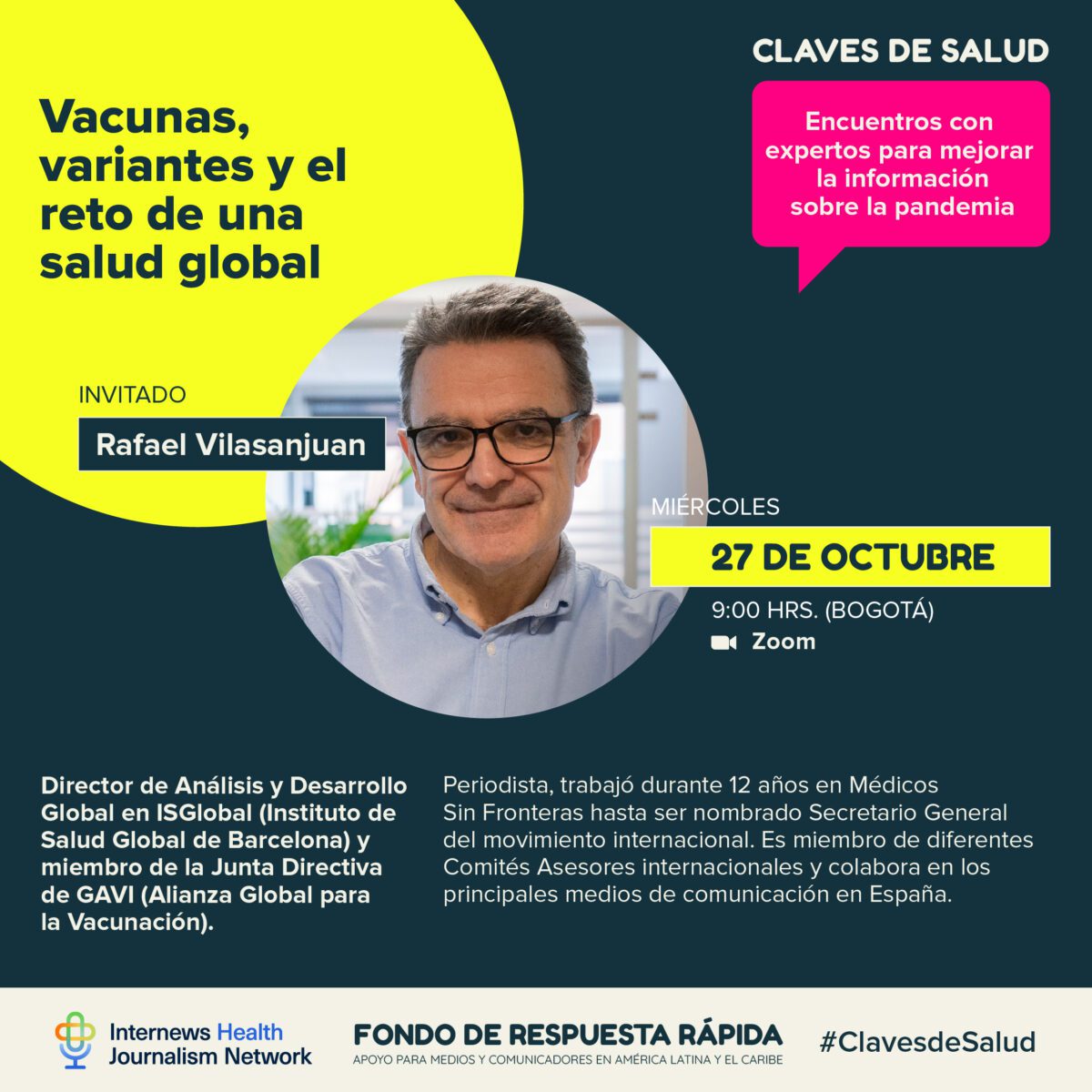
En el segundo encuentro de la serie Claves de Salud, conversamos con Rafael Vilasanjuan, periodista y director de análisis y desarrollo global del Instituto de Salud Global de Barcelona (ISGlobal) desde 2011. Actualmente también es miembro de la Comité Directivo de la Alianza Global para la Vacunación (GAVI).
Conversamos acerca del avance de la vacunación a nivel mundial, especialmente en países de renta más baja, abordando los 5 factores que han dificultado este proceso:
- Acaparación de vacunas por parte de los países occidentales.
- Insuficiencia de la capacidad de producir vacunas.
- Propiedad intelectual y la capacidad de los laboratorios para copiar las vacunas.
- Los estragos de la pandemia en la India, el país que produce el 80% de las vacunas.
- La pérdida de vacunas debido a fallas logísticas.
Hablamos también sobre la importancia de vacunarse, y para cerrar, Rafael Vilasanjuan respondió a algunas preguntas de los participantes sobre las nuevas variantes, la vacunación en menores de edad y la tercera dosis de vacunas.
E-mail de contacto para preguntas o ayuda:
[email protected]
ISGlobal ofrece recursos para periodistas y medios en su página web, que están disponibles para uso abierto, citando la fuente. Algunos enlaces de interés:
- Boletín mensual: https://www.isglobal.org/newsletter
- Sección específica sobre COVID-19: https://www.isglobal.org/coronavirus
- Novedades científicas semanales: https://www.isglobal.org/covid-19-novedades-cientificas
- Documentos de análisis en temas específicos: https://www.isglobal.org/covid-19-estrategia-de-respuesta
- Preguntas frecuentes contestadas por expertos: https://www.isglobal.org/preguntas-frecuentes-vacuna
- Grupo de seguimiento sobre temas estudiados actualmente: https://www.isglobal.org/gcmsc
ENGLISH TRANSLATION
In the second meeting of the series Claves de Salud, we spoke with Rafael Vilasanjuan, journalist and director of global analysis and development at the Barcelona Institute for Global Health (ISGlobal) since 2011. He is currently also a member of the Steering Committee of the Global Alliance for Vaccines and Immunization (GAVI).
We discussed the progress of the vaccine rollout worldwide, especially in lower income countries. We and identified the 5 factors that have hindered this process:
- Vaccine hoarding by Western countries.
- Insufficient capacity to produce vaccines.
- Intellectual property and the ability of laboratories to copy vaccines.
- The ravages of the pandemic in India, the country that produces 80 percent of vaccines.
- Loss of vaccines due to logistical failures.
We also talked about the importance of getting vaccinated, and lastly, Rafael Vilasanjuan answered some questions from participants about the new variants, vaccines in children and booster shots.
#Claves de Salud 3 con Isabel Sola: SARS-CoV-2, un virus que llegó para quedarse
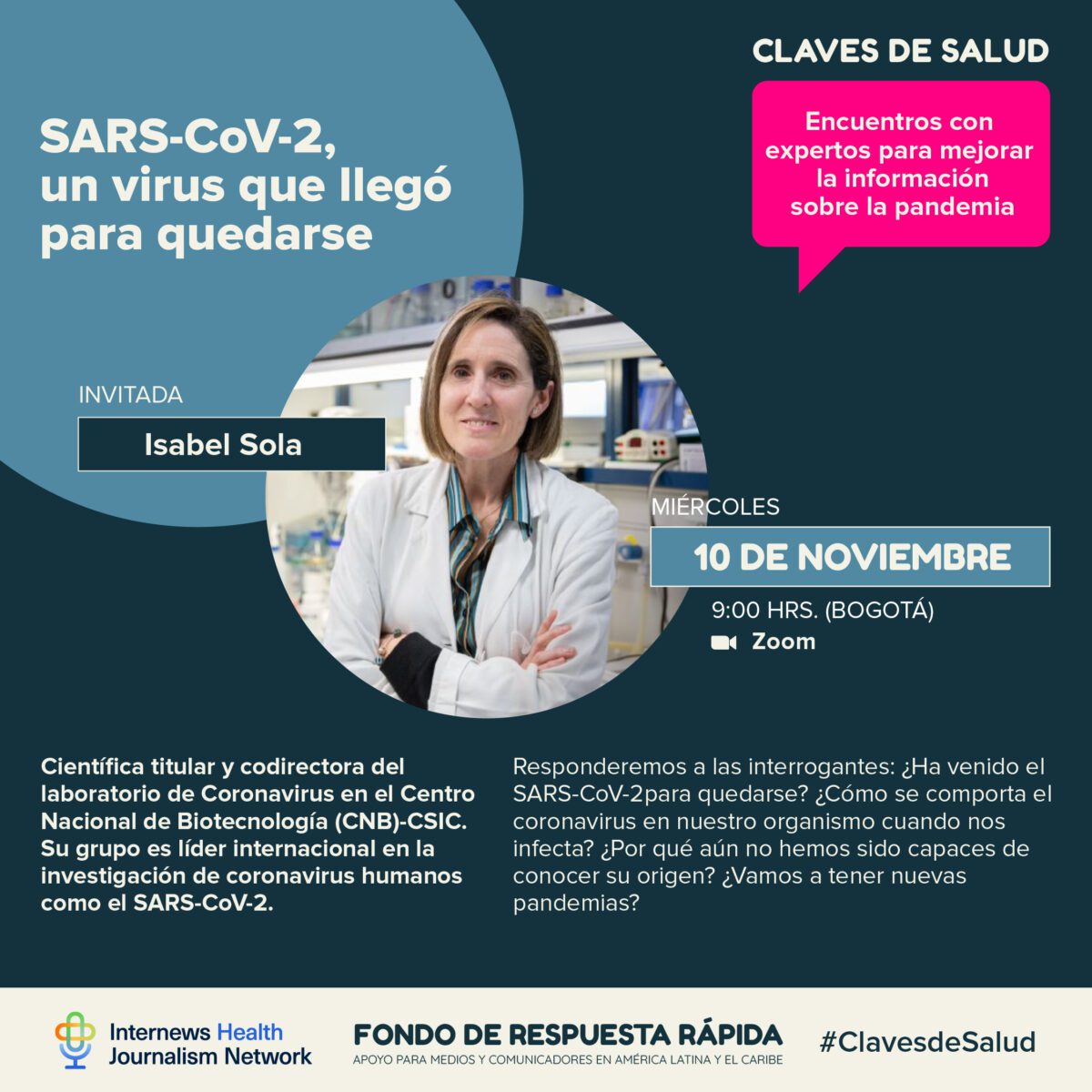
En el tercer encuentro de Claves de Salud, tuvimos la oportunidad de conversar con Isabel Sola, científica titular y codirectora del laboratorio de Coronavirus en el Centro Nacional de Biotecnología (CNB)-CSIC. Su grupo es líder internacional en la investigación de los coronavirus humanos SARS-CoV, SARS-CoV-2 y MERS-CoV.
Iniciamos la sesión hablando sobre la permanencia del COVID-19 a largo plazo, donde cobrará especial relevancia la inmunidad que desarrollemos, ya que eso dependerá el impacto que tenga en nuestra salud. En segundo lugar, profundizamos en las variantes y mutaciones que ha tenido este virus, y sobre los cambios que se espera que tenga a futuro a partir de su capacidad de adaptarse y corregir errores en su composición.
Además, Isabel nos explicó importante conexión que existe entre la pandemia y el calentamiento global: no podemos considerar solo la salud humana, pues está interrelacionada con la salud animal y con el medio ambiente. Hablamos también sobre la estrategia más reciente para combatir al COVID-19, las píldoras, y por qué estas no sustituyen a las vacunas. Finalmente, Isabel nos compartió un poco más sobre las innovaciones que traerá la vacuna que se encuentra desarrollando junto con su equipo.
ENGLISH TRANSLATION
For the third Claves de Salud meeting, we had the opportunity to talk with Isabel Sola, senior scientist and co-director of the Coronavirus laboratory at the Centro Nacional de Biotecnología (CNB)-CSIC. Her group is an international leader in research on the human coronaviruses SARS-CoV, SARS-CoV-2 and MERS-CoV.
We started the session talking about the long-term permanence of COVID-19, where the immunity we develop will be of special relevance, as this will determine the impact of the virus on our health. Secondly, we delved into the variants and mutations that this virus has had, and the changes it is expected to have in the future based on its ability to adapt and correct errors in its composition.
In addition, Isabel explained the important connection between the pandemic and global warming: we cannot consider only human health, as it is interrelated with animal health and the environment. We also talked about the latest strategy to combat COVID-19, pills, and why they are not a substitute for vaccines. Finally, Isabel shared with us all about the innovations that the vaccine she and her team are developing will bring.
#Claves de Salud 4 con Antoni Torres & Dr. Lorenzo Armenteros: COVID y COVID persistente
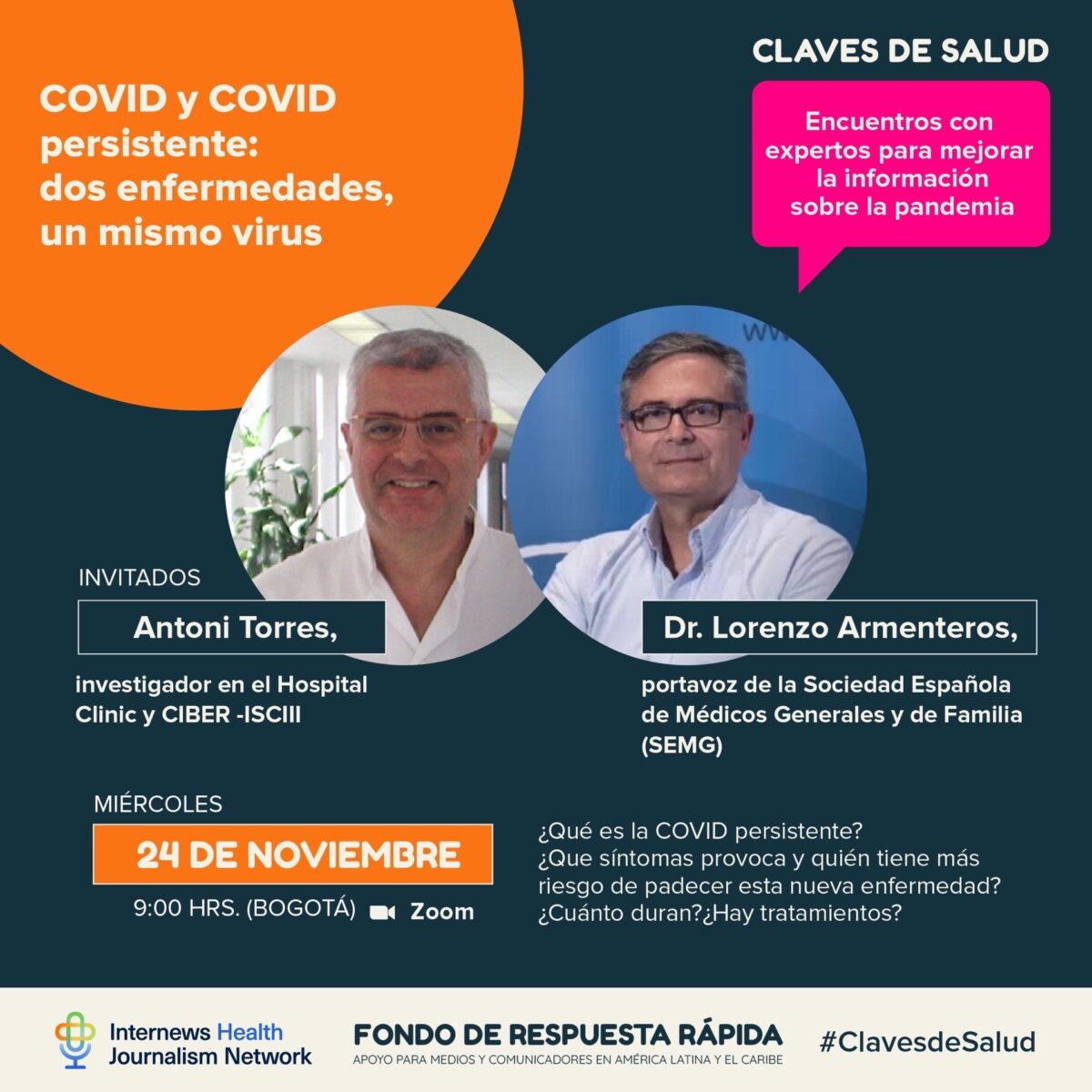
En la cuarta sesión de #ClavesdeSalud, Antoni Torres, investigador en el Hospital Clinic y el Centro de Investigación Biomédica en Red del Instituto de Salud Carlos III (CIBER-ISCIII) y el Doctor Lorenzo Armenteros, portavoz de la Sociedad Española de Médicos Generales y de Familia (SEMG) nos ayudarán a responder: ¿Qué es la COVID persistente? ¿Quién corre mayor riesgo de padecer esta nueva enfermedad? ¿Qué síntomas provoca y cuánto duran? ¿Existen tratamientos?
En el cuarto encuentro de la serie Claves de Salud, conversamos con Antoni Torres, investigador en el Hospital Clinic y el Centro de Investigación Biomédica en Red del Instituto de Salud Carlos III (CIBER-ISCIII) y el Doctor Lorenzo Armenteros, portavoz de la Sociedad Española de Médicos Generales y de Familia (SEMG), quienes nos ayudaron a responder a algunas de las interrogantes más importantes sobre el COVID persistente.
Para iniciar la sesión, hablamos sobre los aspectos más técnicos de esta enfermedad (síntomas, duración, afectaciones, etc.) y cómo diferenciarlo de las secuelas de COVID-19. Conversamos también sobre los estudios e investigaciones más recientes que se han hecho hasta ahora sobre el impacto actual en los distintos grupos poblacionales, sobre todo los niños, así como el pronóstico sobre el avance de esta enfermedad. Profundizamos en una de las principales teorías sobre sus causas: que el virus se mantiene acantonado en diferentes partes de nuestro organismo.
Nuestros invitados compartieron su visión sobre el tratamiento de pacientes con COVID persistente y los retos que esto implica para los sistemas sanitarios y los médicos en general. Finalmente, hablamos sobre la importancia de la vacunación para prevenir las versiones más graves de esta enfermedad.
ENGLISH TRANSLATION
In the fourth meeting of the Claves de Salud series, we talked with Antoni Torres, researcher at the Hospital Clinic and the Center for Biomedical Research Network of the Carlos III Health Institute (CIBER-ISCIII) and Dr. Lorenzo Armenteros, spokesperson for the Spanish Society of General and Family Physicians (SEMG), who helped us answer some of the most important questions about persistent COVID.
To start the session, we talked about the more technical aspects of this disease (symptoms, duration, affectations, etc.) and how to differentiate it from the sequels of COVID-19. We also discussed the most recent studies and research that have been done so far on the current impact on different population groups, especially children, as well as the outlook for the progression of this disease. We delved into one of the main theories about its causes: that the virus is stored in different parts of our organism.
Our guests shared their views on the treatment of patients with persistent COVID and the challenges this implies for healthcare systems and doctors in general. Finally, we discussed the importance of vaccination to prevent the most severe versions of this disease.